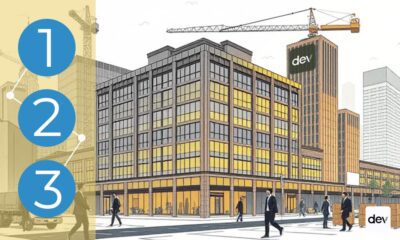
Property Management
Risk or Reward: When Should the Developer Also Be Property Manager?
Examine the debate on whether developers should also serve as property managers, weighing the advantages and disadvantages. This article is essential for real estate developers contemplating the expansion of their roles to include property management responsibilities.
Developers sometimes consider the cost of third-party property management and believe it would be better to do it themselves. This option requires significant thought and planning.
“You need to have expertise,” said Jeff Klotz, CEO of The Klotz Group of Companies, a vertically integrated real estate group that includes development and property management. “Nothing beats the school of life, as they say.”


Klotz said that property management is not easy. He recommends first-time developers shouldn’t do it all themselves.
Should Real Estate Developers Consider Property Management?
There are broad spectrums of views on whether a real estate developer should be both a developer and a property manager. Klotz owns a separate company dedicated to property management as part of his real estate operating company.
Karen Hatcher CPM is CEO of Sovereign Realty, a brokerage, developer, and property management company, and President of the Atlanta REALTORS Association. She says developers and property managers may have different objectives that do not mesh.
“Developers have a mindset based on how long they intend to hold the asset. They’re like a transaction,” Hatcher said. “Property managers, we have to work with assets over time and deliver results over time. So I would say developers looking to get into the property management space find it more advantageous to partner with a property manager.”
Intimate knowledge of a project is why some developers also function as property managers.
“Lots of times the developer can manage it because they’ve built (the project). They’re intimately familiar with the physical aspects of it,” said Daniel Wollman, CEO of residential property manager Gumley Haft. “They’re intimately familiar with the infrastructure of (the project) because they’ve designed and developed it. So lots of times they’re going to be the property manager, as the property opens or they start selling the (residential units on the) property.”


That kind of thinking leads to the benefits of developers as property managers.


What Are the Benefits of Developers Managing Their Properties?
There are many reasons for the developer to maintain control, said Wollman.
“It’s an important thing that you know the project,” he said. “You understand in a new construction or major rehab project how everything works. You maintain control over costs and determine if they go into building costs or into (property) management costs.”
This is a benefit when a project is leased or rented. In that case, Wollman said, “I want to keep control of my building.”


Chenée Joseph, CEO of the Historic District Development Corporation in Atlanta, says there are definite benefits to a developer who is prepared to staff a property management team. “The main advantage, if you have the infrastructure within your organization; It’s obviously a reduced cost,” she said. “You also have better oversight of what happens to the property because you can usually deal with issues quicker.”
What Challenges Do Developers Face as Property Managers?
If a developer decides to be the property manager, there are some real challenges ahead. The key issues are scale, staffing, certifications and licenses, and different missions. Klotz recommends outsourcing property management for the first couple of projects.
“Property management is not easy,” said Klotz. “I would not recommend first-timers doing it all themselves on their first projects. I think that somebody new to the business can learn a lot from a third-party property management company.”
Hatcher raises another issue. If the developer is building outside their local area, not knowing the landscape can lead to roadblocks.
“A partnership (with a property management company) is always best,” she said. “This is especially true in (out-of-area) markets. Their new entrance is not the best way to go. A property management company is going to have all those processes and staff in place.”
Scale is another threshold. Joseph said that if projects are small, the cost of staffing in-house property management can be high. There have to be enough units or projects to make that cost-efficient.
Adding an in-house property management function creates a specialized business. Hatcher warns that a developer will need licensed and certified staff, deal with a new layer of regulations and experience staff turnover.
Wollman says that a developer taking on the role takes on the cost.
“More likely than not, you’re going to pay to not really manage anything, just to learn,” he said. “There’s probably not a lot of great economics in that.”
Klotz said that he created a separate property management company, sold it, and later realized its value, so he repurchased it.
“First-time property managers need to develop their body of experience,” he said. “(They must do this) before they can expect to achieve success better than those who have been in the business already, for many, many years.”


How Can Developers Transition Successfully to Property Management?
Klotz and Hatcher recommend a separate company or division independent of the development company. That separation is important because of the separate missions.
“You know, things might not go exactly how the developer anticipated it,” Wollman said. “There’s a division of cost (between developer and property manager). If systems are not working well, the developer should be fixing those items. If managing the property, the developer looks to sometimes pass those costs back to (the tenants and lessees).”
Klotz says that the developer’s property management company needs to be independent because the property manager’s role is different from that of the developer.
“In my mind, if you’re going to develop the asset, you must manage the asset as well,” he said. “Because nobody cares more about your property or your project than you do. Similar to raising your own kids, right? No one’s going to raise your kids better than you or care more.”
It comes down to building the internal infrastructure. Successfully incorporating property management requires incorporating the expertise in-house for leasing or sales, maintenance, procurement, budgeting and dealing with tenants.
A mind-shift is also needed, as development is a project-based operation, and property management is based on day-to-day operations.
What Are the Long-Term Implications for Developers Managing Properties?
It comes down to a balancing act between the mission of a fixed return on investment and a sustained income.
“You know, real estate is very nuanced,” said Hatcher. “(For property management), you need that long-term thinking. Having the property managers bring that experience of having to manage an asset over an extended period of time versus just a project with a completed life cycle (and) a different mindset of how decisions are made. The ramifications of those versus, ‘Okay, we made that decision, but this project is going to be pulled out in a year. So let’s just roll.’”






